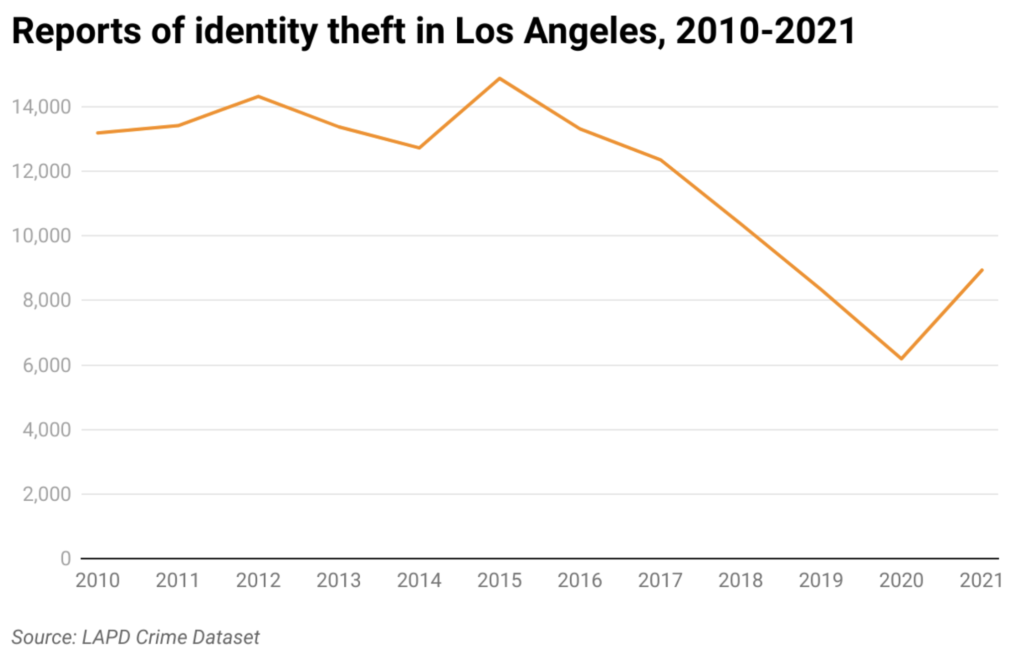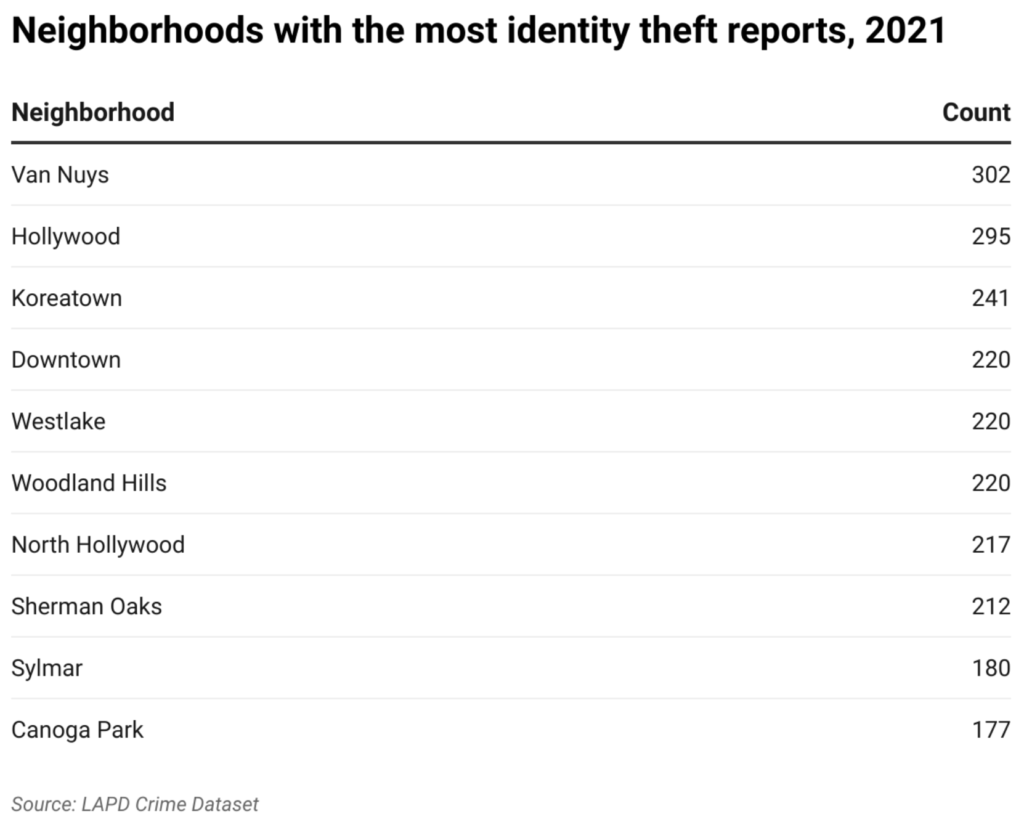Staying a step ahead of identify thefts

Identity theft reports are rising again after a pandemic lull. But even with the presence of sophisticated criminal endeavors, fewer Angelenos than in the recent past are reporting cases to the police.
The 8,943 reports of identity theft in the city in 2021 were an increase of 44% from the previous year, and a 7% rise from 8,335 cases in the pre-pandemic year of 2019, according to publicly available Los Angeles Police Department data.
Still, numbers were much higher a few years ago. There were at least 12,000 cases of identity theft reported to the LAPD every year from 2010-2017, with a peak of 14,884 incidents in 2015.

It is unclear if there have actually been fewer identify thefts since then, or just fewer reported to local authorities. In 2015, the federal government launched a website to make reporting identity theft easier, allowing victims to bypass local police in some cases.
According to Lt. Manny Martinez of the LAPD Commercial Crimes Division, a change in the way banks handle fraud has contributed to the drop in cases reported to the police.
“They used to require you to complete a police report prior to resolving the matter. Now they just take your word at face value,” he said. He mentioned how banks will call customers about suspicious transactions, and will reimburse lost funds up to a certain threshold.
The California Penal Code defines identity theft as unauthorized use of personal identifying information to obtain credit, medical information, property, goods or services.
Martinez said the closure of many police stations in the first part of the pandemic caused identity theft reports to plummet. Numbers rose as people returned to habits that make them more susceptible.
“People are going out more. They’re buying and going to ATMs, so their information is out there more than it was in 2020,” said Martinez.
Cases involving ATM theft with a PIN number shot up from 451 in 2020 to a record high of 1,596 in 2021, according to LAPD data.
Watch that wallet
Martinez said another way people fall victim to identity theft is having their wallet or phone stolen, sometimes from their car. The number of vehicle break-ins shot up in the final quarter of 2021.
Even dining out has its dangers.
“People will skim cards at restaurants, get information out of debit cards or credit cards and sell that information,” said Capt. Alfonso Lopez of the LAPD Commercial Crimes Division.
Other crimes stem from mail theft. Martinez said that includes criminals who find a credit card solicitation. They will apply for a card in a victim’s name using other documents, and once they receive it, they charge up the card.
Reported cases of identity theft that included stolen or forged documents rose to a record high of 332 in 2021, according to LAPD data.
The amount victims of identity theft lose varies greatly, but in extreme cases the criminal effort extends to real estate fraud that could cost millions.
“Sometimes [criminals] would put in a false deed on your property and then take out a mortgage or a second mortgage on it. By the time you find out, it’s in collections,” said Martinez.
In November, the LAPD arrested two men later revealed to be part of a larger identity theft and loan fraud ring that targeted elderly property owners. The duo impersonated the victims and transferred six homes worth $3.5 million to a fraudulent business, according to the LAPD.
Protect yourself
In 2021, Van Nuys logged 302 reports of identity theft, the most of any Los Angeles neighborhood, followed by Hollywood (295 incidents) and Koreatown (241). Van Nuys has recorded the highest number of reported identity thefts every year since the LAPD began making its data publicly available in 2010. Lopez said that is likely a result of a combination of level of income and ease of perpetrating identity theft.

“The criminal element is going to go to where they think they can get more money,” said Lopez.
Authorities have a number of suggestions for avoiding identity theft, including shredding unwanted credit card applications and any document with personal financial information. The LAPD suggests people carry only one credit card in their wallet, pay bills electronically and never give out personal information over the phone.
Martinez suggests that if someone notices unusual financial activity or transactions, they contact their bank and credit bureau immediately.
How we did it: We examined publicly available identity theft data from the Los Angeles Police Department from Jan. 1, 2010-Dec. 31, 2021.
LAPD data only reflects crimes that are reported to the department, not how many crimes actually occurred. In making our calculations, we rely on the data the LAPD makes publicly available. LAPD may update past crime reports with new information, or recategorize past reports. Those revised reports do not always automatically become part of the public database.
Want to know how your neighborhood fares? Or simply just interested in our data? Email us at askus@xtown.la.






